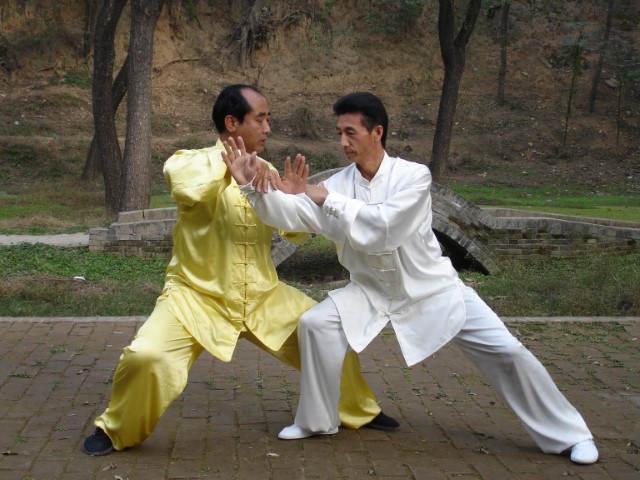
About Tai Chi
What is Tai Chi?
- A Connected Meditation - eyes open, body active, mind connected with the external world yet still and quiet.
- An Amazing Healthcare System.
- The Ultimate Martial Art.
- Beauty in Movement.
- A Great Way to Start the Day.
Tai Chi is all of these things, although different teachers may focus more or less on the various aspects in their own practice and teaching.
For me personally, I would also say Tai Chi is 'A Comfortable Body, Quiet mind, and Grateful Heart', because this is where it leads ultimately.
History
Tai Chi Chuan is one of the products of the Taoist Spiritual Tradition and Chinese Martial Art Culture with roots dating back far into the past.
There are five main styles in existence today :
- Chen Style originating in Chenjiagou Village - Chen Wang Ting (1580-1660)
- Yang Style originating from Chen - Yang Lu Chan (1799-1872)
- Wu (Hao) Style originating from Yang & Chen - Wu Yu-hsiang (1812-1880)
- Wu Style (Small Circle) originating from Yang - Wu Chuan Yau (1834-1902)
- Sun Style originating from Yang, Wu(Hao), Xinyi & Bagua - Sun Lutang (1861-1932)
Chen Tai Chi was probably the original Tai Chi. Other theories favour Zhang San Feng and Wudang Kungfu but there is no historical evidence for this.
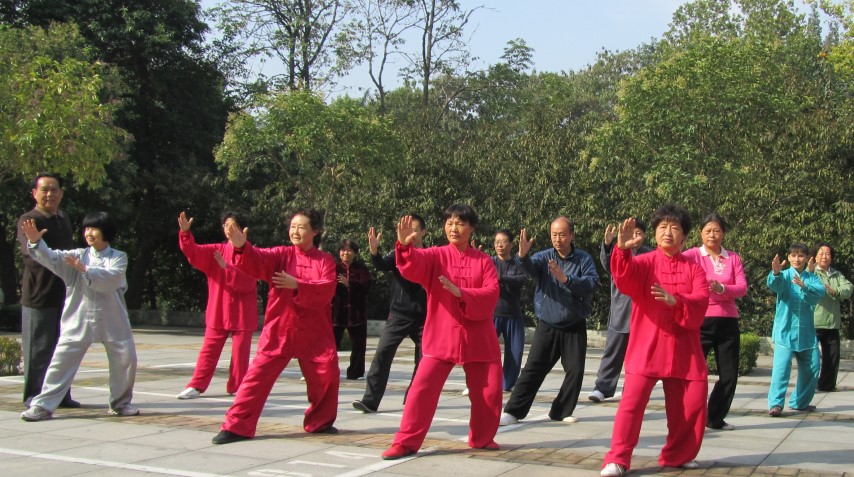 Zhao You Bin's Disciples in Xian
Zhao You Bin's Disciples in Xian
Either way, Tai Chi was influenced by and inherited aspects of the Taoist internal energy tradition which existed much earlier and no doubt also included aspects of body movement.
Chen family Kungfu was already a very high level martial art by the time Chen Wang Ting inherited it around 1600, but by combining it with his knowledge of Taoism, the Yin / Yang, Internal Qi Gong and Chinese Medicine he was able to create a new martial art form which later came to be known as Tai Chi Chuan.
Yang Style Tai Chi was originally created by Yang Lu Chan. Traditionally Chen Tai Chi was only passed on to family members but Yang Lu Chan, who was already a skilled martial artist entered service with Chen Chang Xing and eventually received teaching from him. Yang Lu Chan later had contact with other martial arts including Baguazhang and his own personal style evolved forming the framework for Yang Style Tai Chi.
Wu (Hao), Wu (Small Circle) & Sun Style Tai Chi all evolved later from other high level martial artists who had contact with and were inspired by Yang Style Tai Chi. They are less well known but have their own unique qualities.
So what is it?
Tai Chi Chuan is an Internal Martial Art system which places emphasis on the development and control of Qi within the body.
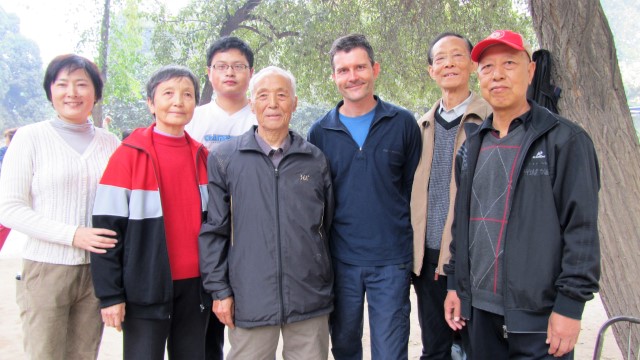 Anthony with Chen Xiaojia Master Shi Lei & family in Kaifeng
Anthony with Chen Xiaojia Master Shi Lei & family in Kaifeng
This is achieved with the aid of the Tai Chi Forms, sequences of movement practised in a meditative state of mind.
Practised at the highest level, Qi enters the body through the feet and rises up to the 'dan tian' or abdominal area.
Movement orginates with subtle changes in the centre of gravity of the practitioner.
This may sometimes be imperceptible to the casual observer, but for the practitioner it generates a strong feeling of Qi moving in the body. The shifting weight causes the 'Dan Tian' or abdominal centre to gently twist and turn which then moves the rest of the body around it in relaxed, circles and spirals, all without the use of muscular assistance.
The highest level practitioner learns not to force the movement either with conventional muscle action or with consciously controlled power from the abdominal dantian. Instead the movement comes naturally by itself powered by the soft Qi rising up through the feet. The feeling is gentle and comfortable. In the beginning it is weak but as the body becomes more 'sung' (relaxed and empty), it becomes very strong, in a quiet way. The Tai Chi simply happens.
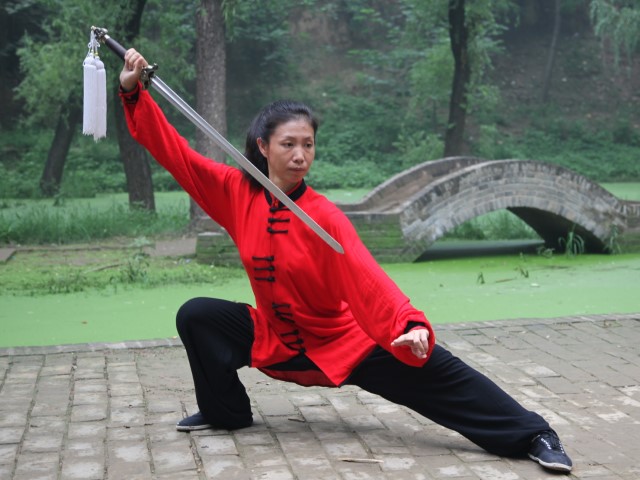 Chen Jun in Chenjiagou
Chen Jun in Chenjiagou
Postures alternate between Yin ones with the Qi resting in the dantian and Yang ones with the Qi out at the extremeties. This alternation recharges the energy and keeps it moving.
The Tai Chi forms themselves are connected sequences of dantian Qi spirals, which one simply connects to inside oneself and consciously surrender to. The actual shape of the form that manifests moment by moment is a spontaneous creation of the body built around the template of the learnt form and doesn't feel stale when done well.
Over time the high level practitioner's body may introduce it's own small circles on to the learnt form and this is natural, but the basic forms themselves have been created by the 'sung' bodies of some of the highest masters of the martial arts and feel satisfying in themselves.
In the beginning only the main dantian in the abdominal region is active, but as the level of the practitioner develops, every part of the body starts to form energy spirals which bring greater and greater subtlety to the movement and so one develops. The body itself starts to change, becoming soft, yet strong, like water.
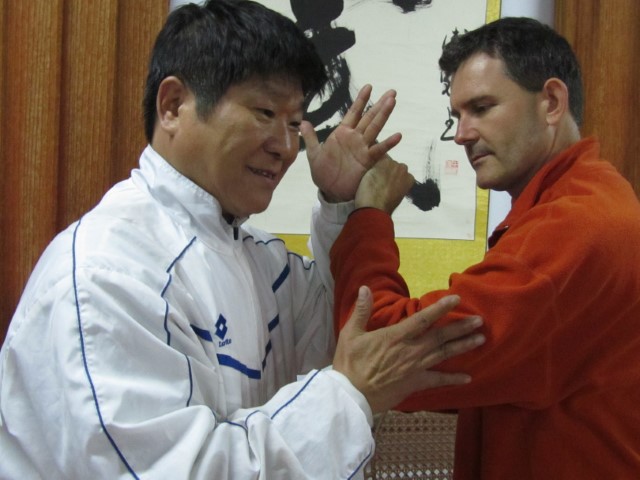 Anthony with Lu Style Master near Handan
Anthony with Lu Style Master near Handan
Achieving this high level requires an amazing ability to relax deeply the mind, body and heart - energy channels fully open and flowing with Qi.
In Tai Chi, this state of relaxation is called 'fang sung' and can best be described as a combination of relaxation, alertness, poise and balance.
A state of being, totally in the 'Now' in body and mind.
If you were holding a glass, the tension in your body would be such that the slightest further relaxation would cause the glass to drop.
If you were to think of yourself as a glass with water in it, surrounded by an ocean. Forget the glass and become the ocean.
Committed practice teaches the practitioner to surrender to the Tao that can guide one between the yin and the yang in the truth of the moment.
This could be called natural movement, it is spontaneous and unaffected without conceptual 'faking' and the feeling when this happens deeply is extraordinary.
Tai Chi can be a spiritual perfection path of the highest order for those who wish to reach for the Ultimate in their life.
For more information on Tai Chi generally, please visit my other website : The China Tai Chi Guide.
News / Events
Upcoming / Ongoing Classes:
Visit the Classes Page...Upcoming Workshops:
15/11 2025 - 30/6 2026 : Sei Ki HeartTouch Emotional Bodywork Therapist Training
Where: Bern, Switzerland -
More...
2/5 - 3/5 2026 : Sei Ki HeartTouch: Working with Anxiety, Emotional Pain & Trauma
Where: Bern, Switzerland -
More...
27/8 - 30/8 2026 : HeartTouch @ The Summer of Love Yoga Festival
Where: Kiental, Switzerland -
More...
16/10 - 18/10 2026 : Sei Ki HeartTouch: Working with Anxiety, Emotional Pain & Trauma
Where: Kiental, Switzerland -
More...
tba 2026 : Sei Ki HeartTouch Emotional Bodywork Therapist Training
Where: UK -
More...
Holidays / Retreats:
Visit the Holiday / Retreats Page...Recently Completed Events:
12/1 - 22/1 2026 : Tai Chi for Well-being & Vitality
Where: Koh Yao Noi, Thailand -
How it went...
2/12/2025 - 10/2/2026 : HeartTouch Classes for Well-being & Vitality
Where: Online -
How it went...
23/11 2025 : HeartTouch: Working with Anxiety, Emotional Pain & Trauma
Where: London -
How it went...
Coaching:
One to One Tai Chi Coaching
Sessions can take several forms:
- General Tai Chi training for Health & Well-being.
- Tai Chi Movement Therapy to help with a specific problem such as fall prevention, stroke recovery, heart attack recovery, chronic fatigue recovery or mental health recovery.
- Adhoc sessions to support a student attending a group based course.
I am happy to consider sessions with anyone whatever their state of physical or mental health.
I am open to invitations to run half-day or full-day tutorial training and may be able to travel to you.
Fee: £80 / hour, £120 / 1 1/2 hours.
